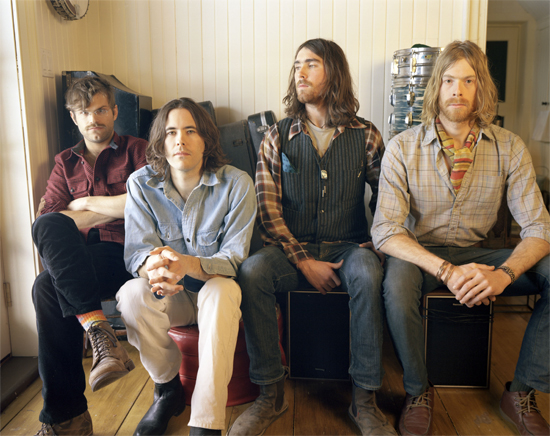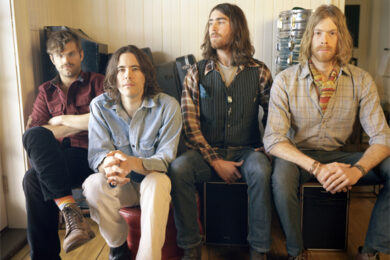Elvis Perkins’ new album, Elvis Perkins in Dearland, was always going to be dogged by the "difficult second" tag. His first, Ash Wednesday, drew comparisons to John Wesley Harding, from its delicately layered melodies to the scale of its ambition. It was also, in places, unbearable to listen to, as it catalogued the sort of raw grief that few listeners could imagine: the death of Perkins’ mother in one of the flights that flew into the World Trade Centre on September 11, 2001, a day off the ninth anniversary of his father’s death.
"No one will survive Ash Wednesday alive – no soldier, no lover, no father, no mother, not a lonely child," Perkins sang on the title track. "All the doors are shut and the windows barely opened up, the fire’s all around… Weep, for its king and queen sleep both now." The revelation that his parents were legendary actor Anthony Perkins and Berry Berenson, an aristocrat, actress, model and photographer, set the music press into a predictable frenzy. It is hard to imagine what led Spin to state, with breathtaking thoughtlessness, "Perkins’ loss is our gain", but it would have been understandable had he grown a hard shell of cynicism and reserve before re-emerging with album two.
Dearland is more joyous than its predecessor, on the surface at least, with lilting backing vocals from Lavender Diamond’s Becky Stark on ‘Hey’, raucous slide trombone on ‘Doomsday’ and a triumphant, Neil Diamond-esque refrain on ‘I Heard Your Voice in Dresden’. But there are still deaths, disappointments and broken hearts aplenty. When Perkins sings calmly, "One, two, three, goodbye; I love you more in death than I ever could in life" on ‘123 Goodbye’, it’s as jaw-clenching as the most anguished moments of Ash Wednesday. The creaking funereal dirge of ‘I’ll Be Arriving’ and the angular fierceness of ‘Shampoo’ delve into noisier territory, and Perkins’ voice snaps, bellows and twists to fit. Dearland is the sound of a quiet artist filling his lungs and stretching his creative limbs, sometimes delicately, sometimes with glorious abandon.
Dearland is pretty rollicking; it made me go back and listen to Ash Wednesday with different ears. I started to hear a lot more lightheartedness in it. I guess it’s only human to find lightheartedness and even humour in the midst of sadness or pain. It’s never straightforward, is it?
"Sometimes it is, and that can be good too. I think this album maybe gets closer to being straightforward. (pauses) As I say it, I’m not sure I believe it. When I see myself having a reaction to something, an event, a breakup, a death or joy, I can’t really linger long in the feeling before wanting to examine it. I analyse my thoughts and my actions and my feelings in the hopes of coming to a kind of understanding of the self and with the self, some kind of deal with how to spend a bit more time in the good way, or the way that feels right, or the way that feels natural. So yeah, the songs can be viewed from different angles and vantages because they’re written from different angles and vantages."
They’re certainly not literal – look at ‘Shampoo’. I’m not going to ask you what it’s all about, but I think that’s what we’re all wondering.
"Really?"
Is there some allusion to the Warren Beatty film?
"Could be."
That line in ‘Doomsday’ – "And though you voted for that awful man, I would never refuse your hand" – it sort of trips off the tongue in a way I can’t imagine it doing if "that awful man" wasn’t out of the picture now.
"Yeah, but that song’s been in that shape long before we knew that we would have the happy outcome that we’ve had."
It made me think of Shampoo the film – the glamorous but doomed prelude to the Nixon era. But we’re on the flipside now. We’ve had the hard years and come out the other side.
"We the Americans?"
The whole world. The whole world is with you.
"That all sounds good to me. I wouldn’t refuse to hold your hand. Or refute that by any means."
What do you think about the idea that Obama’s election means the end of good art?
"Because there’s nothing to gripe about? I don’t think that art needs to be – well, maybe art does, I don’t know if I’m really involved in making art, or interested in making art – but you know, you can always sing praise and sing happy songs. I mean, the times are still pretty dire. We’ve got a beautiful face at the head of this locomotive but there’s still the blues to be sung, and there’s still thanks and praises to be sung. I was thinking about this the other day – why we’re always singing about breakups. Why not sing about the good moment? Although we have those too, I guess."
Not so many good ones, though.
"Yeah, it’s true. We love drama. We’re drama whores."
**Look at David Bowie’s song ‘Kooks’ – that’s a pretty good reason not to write songs about happy things. Plenty of people say, ‘I only write great songs when I’ve just been dumped.’"
"And sometimes I need to dump in order to write a great song."
Yeah. Do you think there’s any truth to that or do you think it’s all self-generated drama?
"I think it is a cultural phenomenon of wanting to be entertained and wanting a story – a distracting story. And wanting to keep things complicated. Which I think we do all the time. It’s part of our MO, keeping things broken."
Just part of being human?
"Yeah, or trying to be something other than human. I sometimes think about how to pull off a simple song of praise and it’s not an easy thing to do, or to think about how it’s going to be received. It’s kind of a quandary."
Speaking of songs of praise, I hear you were an altar boy.
"It’s true. I carried the candle down the aisle at the start of the show."
Which religion was this?
"Episcopalian."
Are they quite jolly?
"I think so. I think it’s sort of like Catholic lite."
So you have candles, do you have robes?
"Yeah, I wore the robe, the red robe with the white smock. I once walked the candle down and the wax dripped and burnt my hand. But I made no sound. We were there to rejoice and I wasn’t going to ruin it. But the beautiful songs and the nice space – I think that’s probably where I first knew the power of song."
Did you sing in the choir?
"Yeah. I wasn’t in the choir but we sang at Christmas time and Easter time and those memories are still with me, those songs. There’s one I can’t seem to get out of my body and expressed on record, and maybe that’s all right, for it to keep coming around. I’m not sure exactly even what song it comes from. Something deep and mysterious that hit me hard as a kid."
I suppose religion has been there since the day music was born. Or vice versa.
"Yeah. Some of the earliest musicians were probably striking and singing with some conception of something greater than our minds. Maybe – undoubtedly – an even purer conception of something sacred or holy, some energy or life. Celebrating life. I guess we’ve taken a left turn away from that."
Yeah, it’s a bit old-fashioned these days to talk about music being more than entertainment – to tackle those big themes and moral quandaries, and to suggest that music has something useful to add to the debate. Because your music is quite ambitious in that way.
"Is it? Hmm. I’m glad you say it is. I experience music to be a magic liquid, or magic substance, with mostly healing properties. And it might be misused or mixed badly, but all things can be. Or in the hands of the wrong doctor, it can make somebody sick. But I believe in the sanctity and the power and the magic of the stuff. And the mystery. I’ve made a couple of records but I don’t pretend to understand how to make a song, or what music is, but I know it forms my conception of the universe and of myself. And now I’m trying to use it for good. You know, the world’s in a dire state and everybody’s got to do their part. And this is what I do, what I’ve signed up for. So I’m making solutions – not answers, but mixing solutions – and trying to help in some way."



